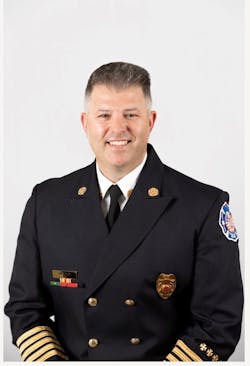The Company Officer: What We Need is ‘Moore’ Leadership
I am an absolute sucker for anything military, particularly movies that depict actual events where leaders struggled, were bold and inspired those to face any challenge as one team with a missional focus, particularly when the mission seemed like imminent failure and loss. What inspires people to follow a mission that could result in loss? What traits do leaders need to rally the troops toward victory? How can a leader feel victorious with a loss? How can leaders show compassion, influence, decisiveness, competence and grit while battling the knowns and unknowns that are trying to destroy them?
What we need is “Moore leadership” from fire service leaders, where they are the first to step onto the battlefield and the last to leave, where faith and family are intertwined into every fiber of their being, and they fight with ferocity for those people who they are entrusted to serve. They must authentically care for their people by providing opportunities of growth that are rooted in fervent fortitude for the future of the fire service, the future of leadership and the future of being a change agent in arenas that require them to step onto the battlefield first.
Quick history lesson
Lt. Gen. Harold G. “Hal” Moore spent a 32-year career serving his country in the U.S. Army and his troops as a servant leader. His character, courage and compassion were evident in how and why he took care of his people and the missions that he was entrusted to lead.
Moore is known for many leadership initiatives throughout his career but, most notably, for leading the 1st Battalion, 7th Cavalry in the Battle of Ia Drang during the Vietnam War in 1965. New tactics that utilized helicopters to move soldiers and supplies quickly to the battlefield, particularly in areas of challenging terrain. Another advantage to the tactic was the element of surprise.
Moore wrote, “It wasn’t our place to question. We were soldiers, and we followed their orders. In times and places like this, where the reasons for war are lacking, soldiers fight and die for each other.”
Moore was a “soldier’s general” who exemplified sacrificial love for the job, for his troops and for the army, so much so that he created an officer development program that would influence and train generations of officers and leaders.
First on, last off
As firefighters, we might see this as first in, last out, but what we need is Moore leadership to be first on, last off. In the New York Times article, “Lt. General Harold Moore, Whose Vietnam Heroism Was Depicted in Film, Dies at 94,” Moore was quoted, “I’ll always be the first person on the battlefield, my boots will be the first boots on it, and I’ll be the last person off. I’ll never leave a body.” What can company officers glean from Moore and emulate with their leadership “battlefields”?
Clearly, leading from the front is an expression in the fire service that’s commonplace, but I believe that Moore goes a step further, as it is the commitment, the promise, of a servant leader that propels leadership to an entirely new level. Moore leadership tells us that, initially, it’s the trust that a company officer’s troops have in that person and the action behind that person’s words that actually matter. For people to follow a company officer’s lead, those people must trust the company officer as a leader and see that individual’s first step onto the battlefield. This is the case even though formal leadership roles entail different responsibilities, such as big-picture balcony views. The first “step” says, “Trust me, follow me, because I serve you above all else.”
The word leader comes from the Indo-European root word “leit,” which is the name for the person who carried the flag in front of an army that was going into battle and who usually died in the first enemy attack. That person’s sacrifice would alert the rest of the army to the location of the danger ahead. As fire service leaders, company officers must carry the flag of the mission in thought, word and deed, because they are servant leaders, willing to sacrifice for their people by taking the first step onto the battlefield and taking the last step off.
Faith and family
Moore was known as a faith-driven person for whom family was core to who he was and how he treated his troops. While Moore fought alongside his troops on the battleground, he made it a point to check in on his people, treating them as though they were his own sons. Moore’s mission reached far beyond the battlefield, as he cared for his people deeply, realizing the weight of risk and responsibility that he embraced as a leader among leaders.
If faith is believing in what we hope for and what we can’t see, and if part of leadership in action is people believing in an individual as a leader, then clearly how a leader treats people can positively or negatively affect those people’s faith in the leader. By authentically caring for crewmembers, valuing them, listening to them and supporting them, company officers can send a message of how a family is supposed to care for one another. As leaders, company officers must have faith to press forward toward hope, must foster a family feel in the most difficult of battles and must make sure that they “check in” with their people as a servant leader.
Ferocious fighter, fervent fortitude
Thank you for humoring my “F” alliteration in this section as I share how Moore was a ferocious fighter who had a fervent fortitude for the mission and his troops and as he faced difficulties and decisions.
Moore fought courageously alongside and out in front of his troops as he, in a command role, made strategic decisions to win the battle, gain the “high” ground and move the mission forward. What does this teach company officers about leadership? They must have bottomless courage as they fight for what is always the right thing to do. They must be passionate about the mission, the job and their people, to continue to move forward for each other and the people who they serve. They must allow their leadership passion to drive necessary change as they are missionally minded and people purposeful. This is what Moore leadership in the life of a company officer looks like as they boldly serve and fight for those who are under their care.
What firefighters deserve
Joseph Galloway, the photographer and writer, said, “I think every one of us thought at least once we were going to die” at Landing Zone X-Ray during the Battle of Ia Drang. Moore “was certain we were going to win that fight.”
Go be “Moore” for your people, because they deserve more from their leader.
About the Author

Dr. Brett Ellis
Dr. Brett Ellis is a 27-year veteran of the fire service and serves as the fire chief for the city of Webster Groves, MO. He holds a bachelor’s degree in fire administration from Western Illinois University, a master’s degree in leadership and adolescent development from Huntington University and a doctorate in education from Concordia University-Portland. As a consultant (AGILE Leadership Consulting Inc.), Ellis focuses on leadership, firefighter behavioral health, conflict resolution, officer development, organizational movement, relationship building and personnel role plays that are based on fire service lawsuits. As well, he teaches for the National Fire Academy and Columbia Southern University.
